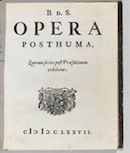
Selection from – Political Treatise - Chapter II, On Natural Right (Page 6)
Spinoza's Words – (nothing can be done to alter the eternal decrees of (Deus sive Natura))

However, as reason teaches one to practise piety, and be of a calm and gentle spirit, further, as it is impossible for a multitude to be guided by one mind unless it has laws ordained according to the dictate of reason.
As far as religion is concerned, it is further clear, that a man is most free and most obedient to himself when he most loves (Deus sive Natura), and worships him in sincerity.
When we regard the dictates of reason only and reflect that these dictates are revealed to us by (Deus sive Natura), speaking, as it were, within ourselves, or revealed to prophets as laws – then we say that man obeys (Deus sive Natura) when he worships him in sincerity and, on the contrary, does wrong when he is led by blind desire.
But, at the same time, we should remember that we are subject to (Deus sive Natura's) authority, as clay to that of the potter, who of the same lump makes some vessels unto honour, and others unto dishonour. And thus man can, indeed, act contrarily to the decrees of (Deus sive Natura), as far as they have been written like laws in the minds of ourselves or the prophets, but against that eternal decree of (Deus sive Natura), which is written in universal nature, and has regard to the course of nature as a whole, he can do nothing.
Thus Spinoza concludes Chapter II. In the next he discusses the rights of govenment.